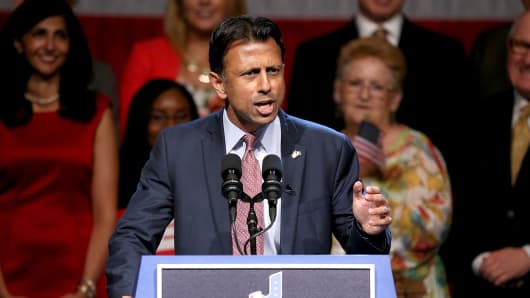The Supreme Court has decided: Same-sex marriage is now the law of the land and accorded the full protection of the 14th Amendment to the United States Constitution. That means it's game over for the 14 states which heretofore have resisted legalizing an individual liberty that is supported by a large and growing majority of Americans. As we would say in a corporate context, a clear and unambiguous decision has been made on what was previously a contested issue; now we all pull together, implement to the best of our ability and move on to tackle the next challenge.
But regrettably, that is not how the political system works these days. Congress has done little else since the health-care law passed but try to undo it, having voted more than 60 times either to repeal it or defund it. Are we now about to have the same distracting and pointless effort to undermine or circumvent the Supreme Court ruling on same-sex marriage?
Read MoreOp-ed: Gay marriage: A sad day for America?
If you listen to the likes of Bobby Jindal, Rick Santorum and Mike Huckabee, the answer, regrettably, is "yes." Jindal, speaking from Iowa, responded to the high court ruling by noting that there is even a higher authority, God, who says that marriage can only occur between a man and a woman. Meanwhile, back home in Louisiana, Jindal's subordinates give the appearance of slow-walking implementation of the Supreme Court ruling. And, for good measure, before decamping to Iowa, Governor Jindal issued a "religious freedom" executive order of the Indiana/Arkansas ilk, even after the Republican Party-dominated Louisiana legislature wisely declined the governor's proposal to enact it as legislation.
It was during those religious freedom/same-sex marriage debates in Indiana and Arkansas that the role of major corporations was, in my opinion, redefined in American life. It was the forceful intervention of Wal-Mart, Salesforce.com and other companies with significant business interests in those two states that stemmed the tide against the proposed laws.
What was meaningful, from a business perspective, was that the corporate activism in Indiana and Arkansas was NOT associated with an issue of direct economic interest to the companies that intervened and that, maybe for the first time in American history, the corporate sector was on the front end of a societal trend. It was ahead of the legislatures and the courts, rather than trailing behind, kicking and screaming into the future, which has been the more normal paradigm for big companies benefitting from the status quo.
Read MoreHedge-fund pros thrilled with gay-marriage ruling
Those companies that intervened in Indiana and Arkansas were guided, I believe, by their own higher authority, which was respect for their own corporate core values. They decided that legislation enabling state-sanctioned discrimination, dressed up in Orwellian terms as a defense of religious freedom, violated those core values and, as such, needed to be vigorously and openly opposed.
Likewise, at NRG, we take our company's core values very seriously and they include "Respect for the Individual" which means to us "all individuals" and incorporates concepts of fairness and equality of treatment and opportunity for all regardless of their sexual orientation. This causes us to reach the same conclusion with respect to these religious-freedom laws and executive orders as our brethren in Indiana and Arkansas. And that imposes upon us a moral obligation, on behalf of our employees at risk, to speak up or at least, to stand up and be counted on this issue.
My work colleagues at NRG deserve the same rights and liberties as their neighbors and relatives at home and their colleagues from around the country, at work. And it is absolutely unacceptable to me, as the chief executive officer, that any of our employees might be exposed to discrimination while on a business trip as a result of their sexual orientation.
Read MoreCorporate America is marching with gay pride
Governor Jindal sees something more sinister at work. In an op-ed published by the New York Times several weeks ago, Jindal attributed corporate opposition to religious-freedom laws -- not as an admirable adherence to core values, but rather -- as a "radical liberal/corporate CEO" conspiracy. Since Governor Jindal has spent his entire adult life in politics, not the corporate world, perhaps he can be forgiven for not having a clue what goes on in a corporate boardroom. There is no "radical liberal" conspiracy infecting corporate America.
Jindal's conspiracy theory is more silly than offensive, but his NYT editorial got worse as it went on. In its summation, he delivered a message to corporate chieftains which could be paraphrased as follows: Let us have our way in legislating social issues and restricting personal behavior that offends us, and in exchange, we will let you bust unions, repress minimum wage, pay minimal taxes, and do all the other things that I assume corporations want to do.
It is true that we are a for-profit corporation, but our core values are neither for sale, nor are they available for trade in some kind of Faustian bargain. Our commitment to the well-being of our employees, which would include equality of treatment and opportunity, is total. So for NRG at least, Governor Jindal's proposal of a strategic alliance between social conservatives, like himself, and major corporations, like NRG, whereby they pursue a business-friendly economic agenda in exchange for our support for discriminatory governmental action is hereby rejected.
Commentary by David Crane, the CEO of NRG Energy. Since becoming president and CEO of NRG Energy in 2003, David Crane has led its transformation from a regional wholesale- generation business to a national, Fortune 200 diversified energy company. David is one of the leading voices in the power industry on the topic of climate change and the need for curbing carbon emissions, and he was one of the first U.S. power industry CEOs to publicly call for mandatory climate change measures. Follow him on Twitter @NRGDavidCrane.


